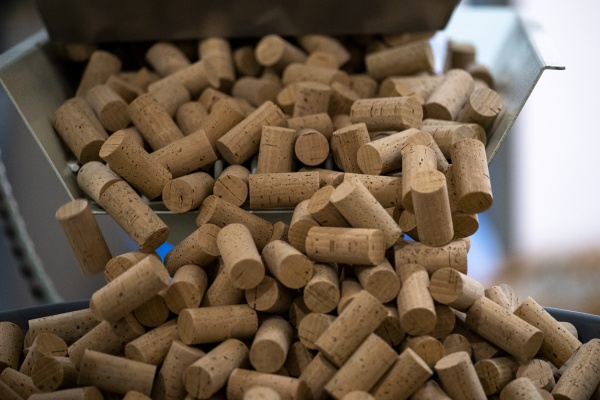Cork stoppers are a natural, recyclable and reusable product. To take advantage of and preserve this valuable resource, a growing number of countries have taken measures to implement recycling initiatives, in order to raise awareness of the importance of this material among local populations. Although recycled cork is never reused to manufacture cork stoppers for wine, there are many other possible alternative applications. For example, corkboards, place mats, coasters, flooring, coverings, components for the motor vehicle industry, and insulation material, among others.
In this context, we have some notable projects implemented in Portugal, some of which were actually extended to other countries such as Spain, USA, Canada, France, Italy, United Kingdom, South Africa and Australia.
Cork Stopper Recycling Bin - São Brás de Alportel Council, in Algarve, launched an original initiative among its residents, at the start of 2005: it challenged them to dispose of used corks in the cork stopper recycling bin. This bin was specifically designed and prepared for this purpose, and several were strategically spread throughout the municipality beside the usual recycling bins. Even before the creation of the Cork recycling bins, this local council had already implemented the fortnightly collection of cork stoppers from around fifteen restaurants of the region. An initiative aimed at the recovery and recycling of cork stoppers from bottles or demijohns to manufacture a variety of products. The new objects can put on sale, thus helping to raise awareness of the importance of ecological issues in the protection of the environment.
Ecocentro Móvel - (Mobile Ecopoint) – In 2021, the mobile ecopoint was launched to be placed in several municipalities of Porto Metropolitan Area. The goal of the project is to collect leftover or residues of all kind which can be recycled such as cork stoppers. This ecopoint travels through different localities on different days, and residents can reach their municipality in order to get informed about the schedule with dates and places where the materials are collected.
RECORCHU - The “RECORCHU” project was created with the aim of collecting cider corks from cider mills and transforming them into other objects; raising awareness of the benefits of collecting them and evaluating their potential uses in collaboration with the DOP Sidra de Asturias, Cetemas and the Asociación Vertidos Cero.
Recycled Cork - This initiative is the result of a project presented by the Polytechnic University of Valencia (UPV) in a competition between universities for very energy-efficient houses with almost zero consumption, in which students collected cork stoppers to produce granulate for efficient insulation. winning the award wanted to continue the concept and are currently placing restaurants, wedding halls, wineries, cideries, taverns, city councils, companies in general, to work together as collection and recycling centers for cork stoppers that are then reused for insulation solutions and soles forfootwear, for example.
La filiera sostenibile dei tappi in sughero -Representatives from the private sector, the third sector and the public sector signed a protocol for a model of virtuous cooperation for environmental and social purposes. The project aims to minimize the waste of cork stoppers that end up in the trash, treating and valuing this resource in the area, promoting the employment of prisoners within the Treviso prison, and activating a social sustainability network thanks to inclusive and participatory activity of citizens and voluntary associations.
With the objective of maximizing the recycling chain and reducing the environmental impact of this waste, but also increasing the social value of the initiative, it offers:
- greater employment opportunities for prisoners with guaranteed continuity
- economic support for non-profit organizations to develop their activities in the social sector
- greater awareness of non-profit organizations and their activities, thanks, for example, to the dissemination of the social message in schools
- awareness of the importance of safeguarding the planet's resources (cork) and the culture of the circular economy.
- Environmental protection, because the valuable cork is saved from being destroyed as waste and used as insulation granulate for ecological house building,
- Nature conservation, through financial support and educational work - especially in schools
- Disadvantaged people and long-term unemployed, by creating jobs in cork processing.
